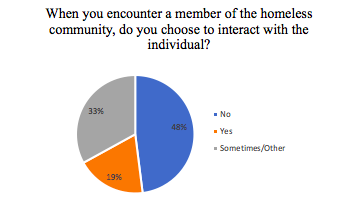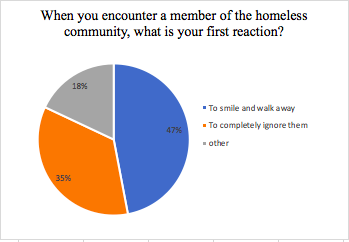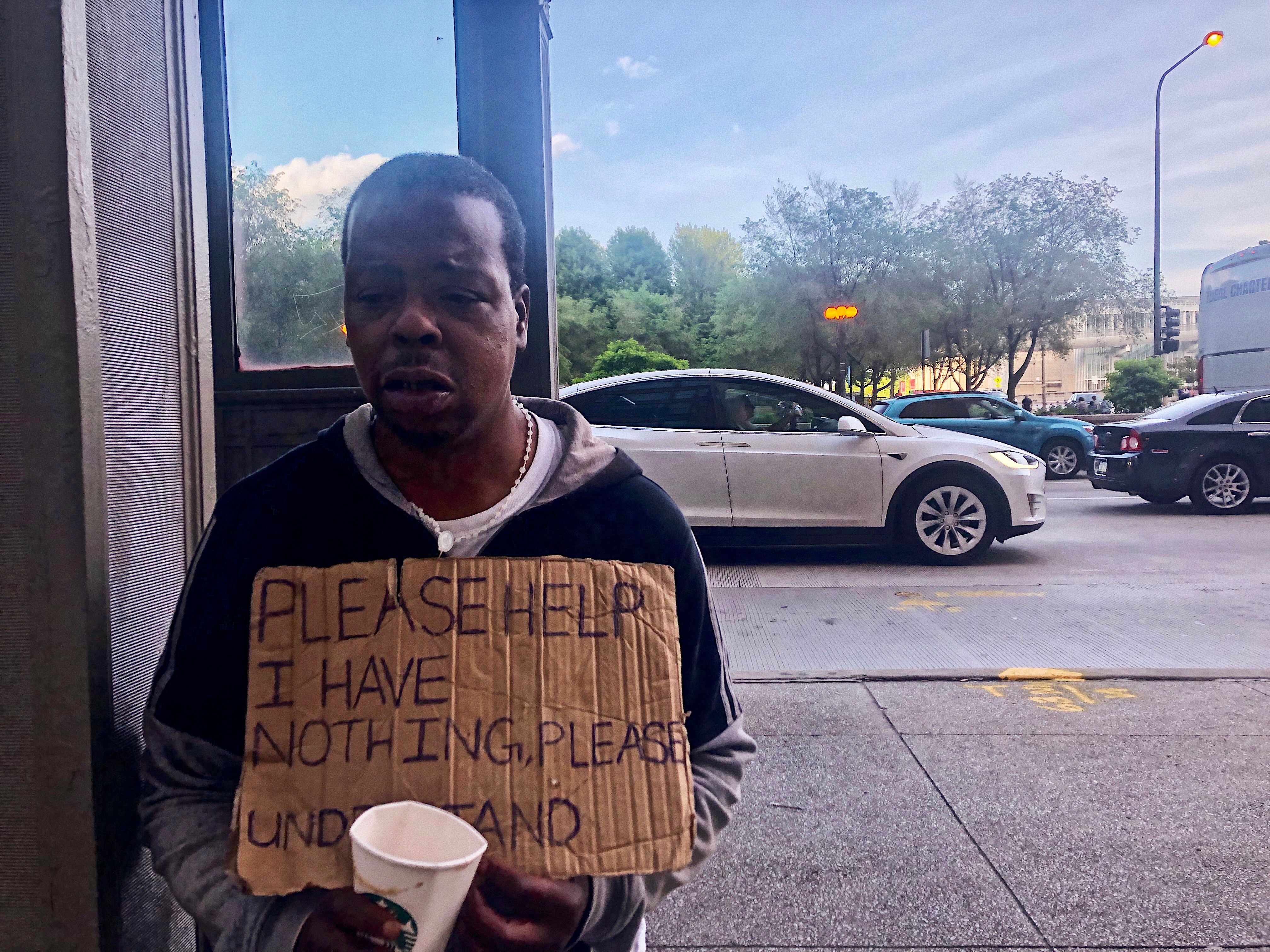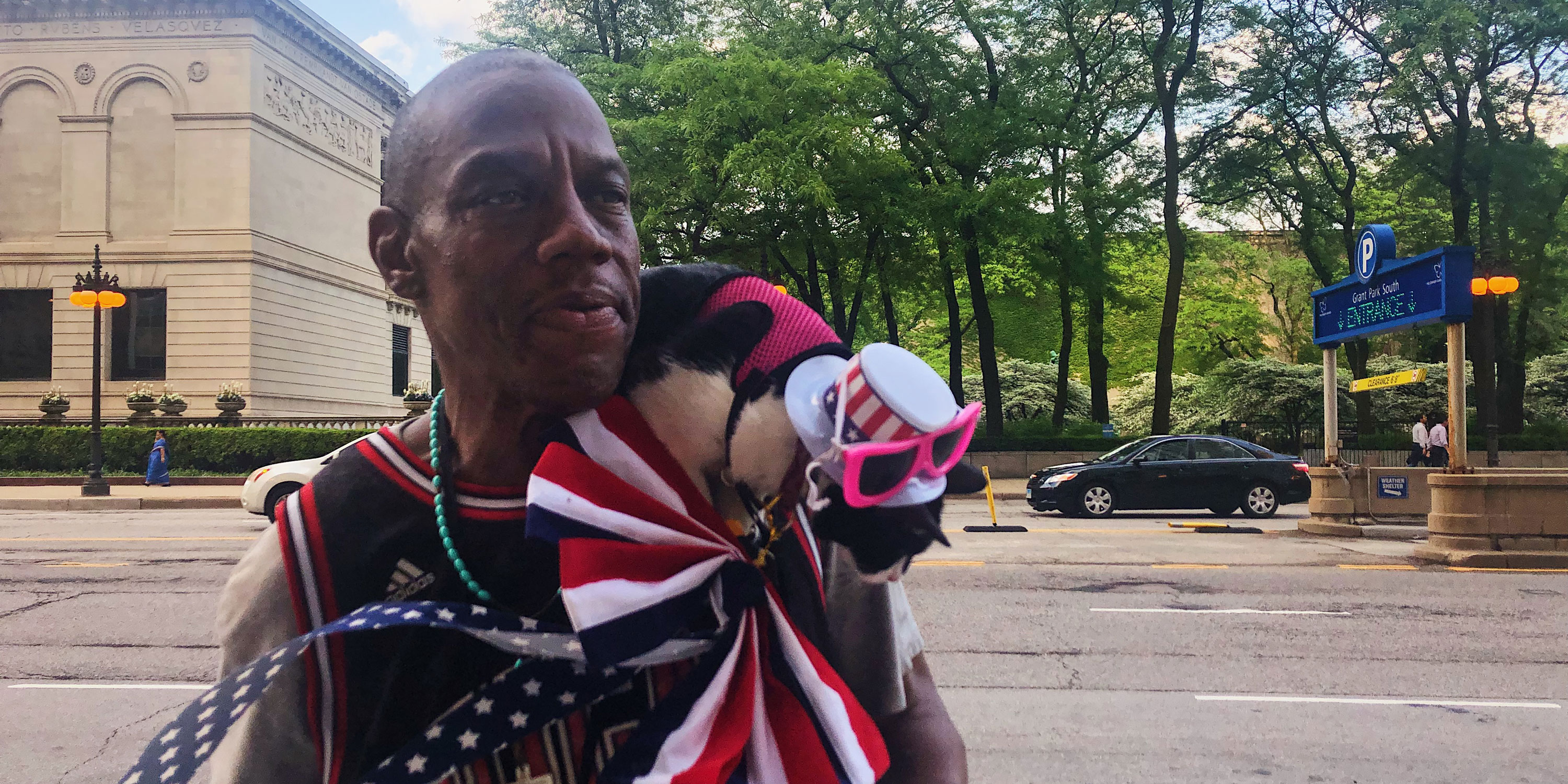The process of initiating discussion and giving humanity to a disregarded population
I have spent my entire life around homeless communities. I have lived in two cities with some of the largest homeless populations in the country — it has become a commonality.
In both cities, I’ve heard the same things:
“Don’t give them money because you don’t know what they’re using it for,” or “be careful, don’t walk near the homeless person, they’re probably crazy.”
Growing up, my mom used to tell me that I should be compassionate. However, her sentiments usually fell into the category of “you don’t know what they’re using that money for” and comments of that sort.
But this year, something changed. I returned home to Philly for a visit and on the ride home from the airport my mom turned to me.
“I want you to know that your dad and I have started to carry cash with us,” she said. “We decided that we are privileged to have so much, there is absolutely no reason we can’t start being more generous on a daily basis.”
I grew up with a constant reminder of how privileged I am. I have parents who give often but never in this way.
“What changed?” I asked her.
“We just realized that we don’t know someone’s story,” she said. “It’s not right to judge someone like that when we don’t know where they’ve been or what they’ve gone through.”
This stigma my parents believed is widespread and I’m not the only one who it has been impressed upon. It is passed from generation to generation.
The Data
To dig deeper into the stigma that I had been raised with, I wanted to know more about what others my age, members of the Generation Z and Millennial populations (ages 4 to 38) — thought about those who are experiencing homelessness.
I created an anonymous survey in hopes of obtaining honest answers that would aid me in unpacking the stigmas surrounding homelessness, particularly those of the young leaders of Generation Z.
Out of the 75 people who took the online survey, only 1 percent reported encountering a member of the homeless community less than once a week. On the other hand, 49 percent reported coming in contact with a member of the homeless community one to seven times a week, and 17 percent reported coming in contact over 15 times a week.
Through the first part of the survey, the data concluded that 99 percent of those surveyed come in contact with members of the homeless community on a daily basis.
However, just because they come in contact, doesn’t mean they choose to interact. But when they do come in contact with members of the homeless community, what is their first reaction?
The following graph demonstrates the answers to the following question:
“When you encounter a member of the homeless community, do you choose to interact with the individual?”

Grace Del Vecchio, 14 East
Many of those who fell into the “sometimes” category said it was dependent on time and if the person is asking for something they can or are willing to provide.
Many respondents said that if they do interact, the homeless person is usually asking for money, and as college students of not many means, they usually do not have anything to give. However, some said that if someone is asking for food and they have some time on their hands, they are more willing to oblige.
“Their situation, homelessness, does not detract from their humanity,” said Chris Carson, 19, one of the survey respondents. “They aren’t people who should be ignored, we should treat them with the same respect we would other strangers.”
Another part of the survey included this question:
“When you encounter a member of the homeless community, what is your first reaction?”

Grace Del Vecchio, 14 East
Himmat Sembhi, 20, said he would “smile and walk away” if he encountered a member of the homeless community.
“I look at them and try and imagine what they went through to be there, and I try and put myself in their shoes,” said Sembhi. “I try to give them spare change if I am carrying any.”
Both Sembhi and Carson commented on the disrespect directed towards those struggling with homelessness and how they believe it stems from a lack of empathy.
“People need to stop living in bubbles and get out there to see what life is really like,” Carson said. “We need to be practicing empathy, people have this unique ability to not grasp this concept.”
The People
Through the results of the survey, I was able to conclude a major cause of stigma: dehumanization. Homelessness, simplified, brings vulnerability and exposure and instead of triggering compassion from those who witness it, it brings judgment.
It’s as if they forget that those who are struggling with homelessness are people.
“Walk right on past.”

Grace Del Vecchio, 14 East
Randy is a 63-year-old Birmingham, Ala. native and Navy veteran. He came to Chicago after being laid off because he was told by family members that he would find better opportunities for work. However, during his stay at Pacific Garden Mission, a shelter in the Near South Side neighborhood, his belongings and the $1000 he had to his name were stolen (he noted that the mission was not responsible). Because of this, he has spent the last two weeks riding the ‘L’ at night and walking the streets of Chicago during the day.
He went on to say he wishes the people who pass him on the street knew one thing.
“To help us out,” he said. “It could happen to them; it could be them.”
Randy is currently waiting on the Chicago branch of the U.S. Department of Veteran Affairs to open up a spot for him. Once that happens, he will hopefully be given the help he needs. Until then, people continue to walk right on past him.
When Communities Unite
Charisma Thapa is a housing organizer for Communities United, a grassroots organization that specializes in organizing around health, immigration, education and housing. Beginning in Albany Park in 2000, the organization grew both geographically and topically to where it now has organizers in neighborhoods on the North, South, and West sides. Through this coalition, CU works to uplift Black and Brown communities across the city and gain a seat at the table for those who are most affected by these issues.
CU works with multiple other non-profits and grassroots organizations across the city that share the same community-oriented goals. Out of this grassroots process, leaders have been created. Leaders who fight for and represent their communities.
“Whenever I go to a meeting, I always bring a leader with me,” said Thapa. “Because we believe this is a community-driven, grassroots process, they’re advocating for themselves and their communities, they represent the voices that are usually not heard.”
To Thapa, part of the problem behind the stigma of homeless is that the conversation regarding homelessness isn’t being initiated in enough spaces.
Additionally, empathy isn’t being practiced in these spaces either. She questions this lack of empathy back asking the tough questions.
“How is it okay that there are people who literally don’t have a home, how does that make you feel?” says Thapa. “Tap into that because I think everyone has some sort of story, everyone’s seen a homeless person before, just think about life and how hard your life would be if you didn’t have a home.”
“Not so well.”

Grace Del Vecchio, 14 East
Levi, 46, has spent the last four years living day to day on the street, intermittently spending time in homeless shelters. After his parents passed away, leaving him with their home, which required repairs and mortgage payments, none of which he could afford, the bank foreclosed on the house.
Although Levi doesn’t like living on the streets, he’s not fond of the Chicago shelters either.
“There’s favoritism, bad feelings, bad conditions,” Levi said. “Things you don’t want to be around, makes you seem like you’re incarcerated, so I don’t go.”
Because of his negative experiences with shelters, Levi is 100 percent reliant on what others give him.
“I try to get enough to eat,” Levi said. “I do the best I can while trying to live out here and trying to cope with being out here.”
He tries his best, even when people don’t treat him so well.
Bringing Chicago Home
Nick Jefferson is the associate director of organizing strategic campaigns at the Chicago Coalition for the Homeless. According to the CCH website, the coalition has had the same mission since its start in 1980: “We organize and advocate to prevent and end homelessness, because we believe housing is a human right in a just society.”
To carry out this mission, Jefferson is currently co-leading a campaign called “Bring Chicago Home” (BCH). The goal of BCH is to increase the real estate transfer tax (RETT) by 1.2 percent which is a one-time transaction that takes place on transactions over one million dollars. This increase affects only 3.6 percent of residential transactions and 5.2 percent of all transactions but in turn, will provide 150 million dollars that will be used to directly combat homelessness.
The campaign, if won, will not only combat existing homeless by decreasing the current number of homeless individuals from 80,000 to 44,000 in 10 years, but it will also combat homeless by taking preventative measures. All the while, addressing the root causes of homelessness.
“A direct cause of homelessness is systematic inequities,” Jefferson said. “One out of five homeless people in Chicago are black or brown. This shows a direct result of disinvestment in those communities.”
“Invisible.”

Grace Del Vecchio, 14 East
Ishmael, 58, had been homeless for the past seven years. After serving 32 years in prison, he was able to work his way up to head janitor at Bennigan’s, an Irish pub-themed casual dining restaurant on the corner of Adams and Michigan in the Loop. But in 2012, when the restaurant was bought out by Walgreens, he was laid off. He applied for a job at Walgreens and other places, but due to his incarceration history, no one wanted to hire him.
“Nobody wants to give me a job, even though I’ve done my time,” he said. “So, I’m stuck between a rock and a hard place.
Ishmael spends every day with his cat, Angela, who he met three and a half years ago. Together, they’ve built relationships with members of the Chicago Symphony Orchestra, who have given them coats and scarves for the winter months. Despite being treated as though he is invisible the majority of the time, he remains positive.
“I met some of the best people in the world out here and some of the worst people out here,” said Ishmael. “Good always wins, if I didn’t believe that, I wouldn’t even wake up.”
Stigma Hurts
When discussing stigma, Jefferson said that a leading cause is a misconception. Many think that those who are homeless are on the street because of mental illness, laziness or a lack of education, but that is largely untrue.
“It is just assumed that people on the street have some kind of mental health diagnosis, but there’s [also] a stigma around education levels and working,” Jefferson said. “There’s a high percentage of adults [experiencing homelessness] that are actually working or that have a college degree, almost a quarter. The stigma is misconceived.”
I used to get so upset with my mom when she would walk by a homeless person without engaging with them. But now she sees how this stigma hurts not just our communities and how it requires the practice of empathy and understanding to combat it.
It’s not easy to go against stigma, it’s ingrained in us, we carry it with us everywhere we go. Yet, this stigma is what holds us back from engaging with our homeless communities and bridging the gap of systematic disinvestment.
She sees this now, and that’s a start.
That’s why my mom carries cash.
What You Can Do (Your Call to Action)
Although initiating discussion is always a great place to start, it’s never enough. The following are ways for you to combat homelessness in your community, whether it’s through donating, advocating, or volunteering, there are many ways you can join the fight against homelessness in your community.
Join the Fight in Chicago
Become a leader with Communities United by joining one of their many initiatives around affordable housing, youth organizing, justice reinvestment, and more.
Donate to the Chicago Coalition for the Homeless. Along with initiating strategic campaigns such as Bring Chicago Home, donations to CCH go towards work with advocacy and public policy and funding for college scholarships.
Support and vote for Bring Chicago Home. In order to get BCH on the ballot on March 2020, City Council must vote to put the question on the ballot which asks voters to raise RETT. In order to make this happen, contact your alderman and request that they vote to put BCH on the ballot in 2020.
Join the Fight in Philadelphia
Donate to and Volunteer with Project HOME. Project HOME’s mission is not only to create informed volunteers and constituents but advocates within the Philadelphia community. Join their cause as an individual, organization, or school group to join in your community’s fight.
The Philadelphia Citizen is known for its long-time fight against homelessness and does so by publishing regularly on the state of homelessness in Philadelphia and how it can be combatted. Be sure to stay updated by reading, sharing, and acting on their pieces on homelessness.
Join the National Fight
Stay up to date on the National Coalition for the Homeless campaigns and see how you can advocate for these campaigns your community and communities around the country.




NO COMMENT